M. Allen Cunningham's Blog, page 9
October 18, 2018
26 Books I Kept Close While Writing My New Novel Perpetua's Kin

Possession by A.S. ByattNearly 20 years after I first read Byatt's Booker Prize winner Possession, her use of the epistolary form still dazzles me. She's unafraid to take up 50 to 60 pages with the "primary texts" of a correspondence. Surely she had editors nagging her to share only "the highlights" of her characters' letters. But that would have yielded a fundamentally different novel -- and probably a flimsy one. Perpetua's Kin has its own lengthy epistolary sections.
Machine Dreams by Jayne Anne PhillipsPhillips conjures mid-century America with such tactile vividness, familial tensions with such ease, and the scope of tragedy across 3 generations. Her structure here inspired mine in Perpetua's Kin.
A Sudden Country by Karen FisherSentence for sentence, Fisher's narration hypnotizes. She charged my batteries at a time early in my writing of Perpetua's Kin, when I (and the novel) really needed it.
Voss by Patrick WhiteCited by Karen Fisher as an antecedent to A Sudden Country, the prophetic power of White's prose is always inspiring. He won the Nobel Prize in Literature for good reason. His depiction of landscape and the small figure a man cuts against the earth remained luminously in my mind during my work on Perpetua's Kin. (As noted in the acknowledgments, Perpetua's Kin makes use of a few phrases from Voss.)
The Eighth Day by Thornton WilderAn epic metaphysical mystery spanning decades and continents, winner of the National Book Award, this inimitable novel gives us the prophetic and epigrammatic Wilder we know from The Skin of Our Teeth and Our Town, but here he has the greater breadth of novelistic description and frequent rhetorical passages. I studied his commanding way of depicting small incidents within a massive canvas.
The Favorite Game by Leonard CohenLine for line, Cohen's overlooked jewel of a novel (his debut) goads me on to breathe freer, see clearer, and do and try more.
Hamlet by William ShakespeareI was first exposed to the immortal Dane via Franco Zeffireli's film adaptation, which I viewed in the cinema when I was 12. I've seen innumerable versions of Hamlet on film and stage since then, (including the Barbican's unforgettable 1997 RSC production starring Alex Jennings) and I've never stopped returning to the original text. I've described Perpetua's Kin as a reworking of Hamlet, and I'd wager that keen readers will spot the many allusions and outright quotations in the text of the novel (e.g.; Denmark has Elsinore, while my Northern California of the late 1880s has El Señor).
The Spectator Bird, Angle of Repose, and Recapitulation by Wallace StegnerIf you live in the West, you should know and read Stegner. If you don't live in the West, you should know and read Stegner. If you love literature, you should know and read Stegner. National Book Award and Pulitzer Prize winner and dedicated teacher.
The English Patient by Michael OndaatjeOndaatje's distillation of "big-canvas" events through intimate scenes and relationships, his use of alternating points of view, his characteristically evocative turns of phrase, and his central placement and reliance upon imagery -- these are just a few of the things that The English Patient (and, for that matter, most of Ondaatje's novels) -- exemplify for me.
Time's Arrow by Martin AmisIt is no exaggeration to say that my first reading of Time’s Arrow changed my life. The sheer authorial bravura on display was like nothing I’d known in contemporary literature. Is there another contemporary work as technically daring and as gracefully executed?
The Night Inspector by Frederick BuschBusch's masterwork. His use of nineteenth-century parlance, his facility with the violent narratives of Civil War combat, and the sustained intensity of his language, treatment, and themes are all absorbing and instructive. One of the great unsung American novels of the last 20 years.
Raising Holy Hell by Bruce OldsA precursor (by 22 years or so) to George Saunders' astonishing experimental-dramaturgical-collagist-novelizing in Lincoln in the Bardo. My first reading of Raising Holy Hell was for me the beginning of a new way of looking at narrative. And Olds' ventriloquism inspires much of Perpetua's Kin. (I thank my friend Jon L. for introducing me to Olds' work.)
From A to X by John BergerA tremendously affecting epistolary novel by one of our greatest writers.
Cold Mountain by Charles FrazierThe cool and remote evocations of the savagery of the Civil War.
I Should Be Extremely Happy in Your Company and Fall of Frost by Brian HallIn both of these novels, Brian Hall demonstrates a breathtaking command of -- and flexibility in -- narrative voice. He is also constantly taking risks as a writer, whether inhabiting the first-person perspective of Sacagawea (and inventing a new narration technique to do so) or scrambling chronology while writing about Robert Frost.
The Journals of Lewis & Clark, edited by Bernard DeVotoA document of Manifest Destiny at ground level, and in the form of two unlikely and fascinating protagonists. The scale of history is, in the end, always human.
Amusing Ourselves to Death by Neil PostmanPostman's seminal work of cultural criticism has been on my mind for more than a decade now, and its lessons have in some way infused everything I've written in that time, fiction and nonfiction alike. "We have learned irreverence toward sun and season," Postman writes. And I put those words directly into the mouth of one of the minor characters in Perpetua's Kin.
Selves at Risk by Ihab Hassan"The abiding question concerns the American quester, the motive, history, and space of his journey, how that space affects him, and the nature of his own self-apprehension as an other, an American, as he moves in the contemporary world. For Otherness is not merely given, an attribute of others; it can be an attribute of ourselves, either in self-alienation or in response to the relentless gaze of another." I kept this and many other passages from Hassan's book at hand while thinking about Benjamin Lorn's journey(s) in Perpetua's Kin.
Fame & Folly, Art & Ardor, and The Din in the Head by Cynthia OzickOzick is our finest living literary critic and essayist. Just go read her essays, please.
The Liberal Imagination by Lionel TrillingI've been reading Trilling since first being introduced to his work via Cynthia Ozick. If you love literature, then Trilling's perspectives, and his ways of thinking about literature on the page -- free from every critical hand-me-down -- are always enriching.
The Boys' Crusade by Paul FussellFussell writes as a World War II veteran committed to tearing down vainglorious delusions about the "nobility" of war. He's a staunch realist, and also an elegant writer. I gleaned so much from this book as well as Fussell's memoir Doing Battle, and I'm thankful for his voice.
Published on October 18, 2018 12:22
September 14, 2018
PERPETUAS KIN Book Trailer: Wanderlust
Published on September 14, 2018 10:02
September 13, 2018
Meine Wörter auf Deutsch
I'm very pleased to see an excerpt from Lost Son, my 2007 experimental biographical novel about Rainer Maria Rilke, included in the new issue of the International Rilke Society Journal.
Mit Dank an Erich Unglaub.
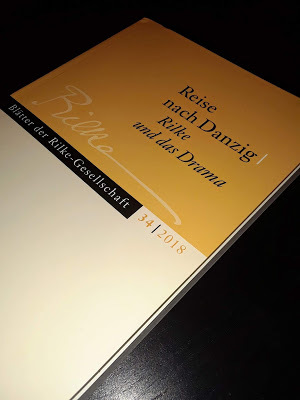
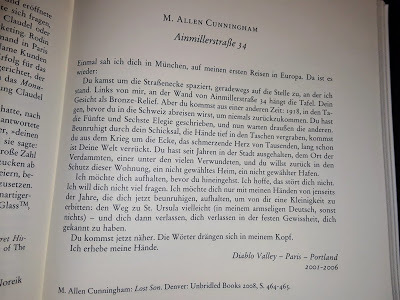
Mit Dank an Erich Unglaub.


Published on September 13, 2018 10:59
August 6, 2018
Perpetua's Kin: Early & Late, Pt. 2
Early & Late" is a series of posts featuring texts and images that document the process of writing
Perpetua's Kin
, from manuscript to finished novel.
Perpetua's Kin appears in September, 2018, but you can secure an early copy now by ordering HERE . (Orders ship within 24 hours.)
Early:Manuscript page, 2007/2008

Late:Final version, 2018

Perpetua's Kin appears in September, 2018, but you can secure an early copy now by ordering HERE . (Orders ship within 24 hours.)
Early:Manuscript page, 2007/2008

Late:Final version, 2018

Published on August 06, 2018 06:00
August 3, 2018
Perpetua's Kin Elicits Early Applause from Booksellers Across the U.S.

"Cunningham has once again raised the bar on the art of the novel...exceptionally rich...a distinctly American portrait, but the overarching themes are universal. I walk away from a reading like this ruminating on the largeness of life and the lasting influence that novelists can have on every one of us." - Nancy Scheemaker NORTHSHIRE BOOKSTORE, Saratoga Springs, NY
"Beautiful...takes the reader right in. Cunningham gives us a book to savor -- a fulfilling, substantial book, and a joy to read." - Janet Boreta founder, ORINDA BOOKS, Orinda, CA
"I very much hope Perpetua's Kin reaches as many readers' hands as possible...expansive in scope and ideas...enchanting." - Hans Weyandt
MILKWEED BOOKSTORE, Minneapolis, MN
"A poetic, kaleidoscopic look at intergenerational pain, love, longing, and restlessness, through the lenses of war and telegraphy." - Carolyn Kulog
BETTY'S BOOKS, Baker City, OR
"Expertly imagined...from the battlefields of the Civil War to Ocean Beach in 1940s San Francisco ... Much to contemplate in this thought-provoking novel." - Marion Abbott
MRS. DALLOWAY'S BOOKSTORE, Berkeley, CA
Perpetua's Kin appears in September, 2018, but you can secure an early copy now through the publisher (orders ship within 24 hours)
Published on August 03, 2018 13:03
July 31, 2018
"There is glorious country here, Alma. Mountains like you...
"There is glorious country here, Alma. Mountains like you never dreamed. Were you here and could you see it you would better understand me. There's grandeur at every turn and it puts grandeur in the heart. One's feelings get bigger. I don't know how to say it." -Perpetua's Kin, p.273 Atelier26books.com/perpetuas-kinA post shared by Atelier26 Books (@atelier26books) on Jul 31, 2018 at 11:02am PDT
Published on July 31, 2018 11:35
May 22, 2018
Perpetua's Kin: Early & Late, Pt.1
"Early & Late" is a series of posts featuring texts and images that document the process of writing
Perpetua's Kin
, from manuscript to finished novel.
You can pre-order Perpetua's Kin HERE.
Early:Manuscript page, 2007/2008
Late:
Final version, 2018

You can pre-order Perpetua's Kin HERE.
Early:Manuscript page, 2007/2008

Late:
Final version, 2018

Published on May 22, 2018 06:00
May 17, 2018
The Green Age on "A.Word.A.Day"
This week I was delighted to see that
The Green Age of Asher Witherow
, thanks to its use of the word "saprogenic," earned a citation in Wordsmith.org's popular "A.Word.A.Day" feature.
The New York Times has called A.Word.A.Day "the most welcomed, most enduring piece of daily mass e-mail in cyberspace."

The New York Times has called A.Word.A.Day "the most welcomed, most enduring piece of daily mass e-mail in cyberspace."

Published on May 17, 2018 09:24
May 16, 2018
How to Publish a New Novel in 2018
My fourth novel, Perpetua’s Kin, will appear this September. Those who know me know that this book has been a long while coming. For most writers of new literature, these are strange, hungry, inhospitable times. In this post I want to share why it’s taken so many years to publish Perpetua’s Kin and why I hope that if you appreciate literature, you will read this novel.
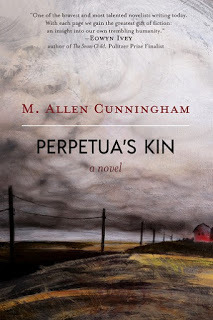 I believe Perpetua’s Kin offers a uniquely affecting and surprising reading experience. And let me be clear. when I say I believe, I’m not talking about stubborn, run-of-the-mill confidence or defensiveness (e.g., “I think it’s good!”). No, I’m talking about belief that comes of having paid the existential costs of the book’s composition and editing process.
I believe Perpetua’s Kin offers a uniquely affecting and surprising reading experience. And let me be clear. when I say I believe, I’m not talking about stubborn, run-of-the-mill confidence or defensiveness (e.g., “I think it’s good!”). No, I’m talking about belief that comes of having paid the existential costs of the book’s composition and editing process.
You will know what I mean if you’re a novelist and you’ve undergone a sacrificial, years-long dedication to a book, i.e., to the act of writing, rewriting, effacing, writing again, shaping, and drastically reshaping a raw mass of words until it becomes a novel. Becomes is the keyword here, for you do not make or even write a novel so much as suffer its convulsions, confusions, and convolutions until it emerges into clarity all its own and becomes. In other words, the novel becomes an artistic creation thoroughly and surprisingly itself — a creation apart from you, which has answered to its own demands, and therefore, in some mysterious but unquestionable way actually surpasses you: speaks in ways you don’t know how to speak, knows more than you know, feels more than you feel.
All this may seem esoteric to non-novelists, but some years ago, watching as my agent sent this novel out among the “decision-makers” of the publishing world, watching as it came back again and again, I began to understand that rather than some innate problem in the book, it was the book’s essential literary merit — its autonomous completeness as an artistic creation — that prohibited it from finding an advocate in mainstream publishing. This kind of paradox is all too common in today’s publishing industry.
So I’m releasing Perpetua’s Kin through Atelier26 Books , the nationally recognized literary press I founded some years ago in order to lift up good literary work. As the editor of Atelier26 I’ve had the privilege of helping a number of marvelous authors bring their books to readers. I believe deeply in the beauty and power of each Atelier26 book I’ve edited and published, and I can hardly describe how gratifying it’s been to watch a few of these titles receive prestigious award recognition . I’m proud to see Perpetua’s Kin join the company of all the excellent works at Atelier26.
While some of my own prior books have borne the Atelier26 logo, I’ve never actively promoted any of them. Mainly they’ve served to bolster the Atelier26 catalog and generate some extra proceeds for the press as a whole, while I’ve poured most of my energy and focus as a publisher into supporting and promoting my other authors. Perpetua’s Kin will be different, which brings me to confront anew that stamp of contempt used by so many literary folks who wish to stigmatize and dismiss a book without even looking at it: self-published.
What does self-published mean anyway?
I almost made that the parenthetical subtitle of this post, because part of what I’d like to do here, in providing my own professional history and personal perspective as an artist, editor, and publisher, is to complicate in some small way the stubbornly prevailing, mostly snarky understanding of “self-published author.”
Again, maybe you’re a literary author yourself. Maybe, at this moment in your life you’d never dream of self-publication. Maybe at this moment you’re riding high, perhaps with your own work of new literature hot off the press from an established commercial publisher big or small. Maybe your work has been well-reviewed but not particularly hot in sales. I have first-hand experience of those circumstances. You may find my story interesting.
So, with Perpetua’s Kin as a case in point, here’s one way to publish a “new” novel in 2018:
Between 2004 and 2007, publish 2 well-received novels with an established small press;
watch your novels receive wide and laudatory coverage in mainstream outlets & publishing media (USA Today, Publishers Weekly, San Jose Mercury News, Booklist, The Salt Lake Tribune, Library Journal, &c.);
watch as booksellers champion your novels (#1 Indie Next selection; Best of Indie Next; Indie Next Book of the Year Finalist; staff picks);
in what will become the busiest 6 months of your life, fly from Oakland to Minneapolis, from Oakland to Memphis, from Oakland to Seattle, from Oakland to Los Angeles on a bona fide author tour through more than 15 U.S. cities, meeting lots of folks who have read your book(s) or are buying a copy in order to do so;
speak publicly before thousands of people collectively; lecture; teach;
start that “new” novel (novel 3) in February 2007, a year before your son’s birth;
immerse yourself, as you’ve always done, in novelistic research (in this case the history of the telegraph; Civil War campaigns and prison camps; the geography of the U.S. south) & travel from your home in Oregon to Missouri and Iowa for this research;
complete novel 3 & receive a publisher’s offer in 2010;
decline the offer;
wait, while your NY literary agent submits the novel to other parties;
undertake your first Yaddo residency & start writing another novel (your fourth);
back at home, observe the dissolution of Borders Books and the closure of Borders stores everywhere ;
continue writing like hell, still awaiting responses to your agent's submissions of novel 3;
begin to realize, gradually, how much money Borders owed to publishers , and what those unpaid debts mean to the publishing industry as you’ve known it;
receive the news that the publisher of your first two books is cutting its operations way back;
watch the whole publishing ecosystem falter;
watch newspapers & magazines vanish & with them scores of book review outlets;
watch, dismayed, as independent bookstores (many of those that hosted you on tour) go out of business;
meanwhile, receive rejections for novel 3 & realize, to your horror, that publishers are playing it safe & deciding acquisitions on the basis of Nielsen Bookscan sales figures & other faulty marketplace metrics more often than on the basis of literary quality; understand, chagrined, that this is the new M.O.;
fret about the monopolistic ruthlessness of Amazon, the closure of more small bookstores, the hype surrounding e-books , the rise of the iPad;
notice that online star ratings & customer reviews now stand in for literary criticism;
compare the experience of fellow writers & note the industry’s new exclusive focus on gigantic advances and probable blockbusters, the all-but-conclusive disappearance of the long-endangered midlist ;
fret about the further conglomeration of mainstream publishing into just four major publishers all owned by multi-national media corporations ;
continue writing like hell;
meanwhile you are your son’s primary at-home parent: he is an infant, he is a toddler, he is in preschool, he is in kindergarten... ;
establish a publishing house called Atelier26 Books & try to help other writers by editing, publishing, & promoting their work (you will devote your more-than-full-time labor to this for years);
return to Yaddo, still writing like hell, and start your fifth novel;
receive grants & fellowships;
learn that your NY literary agent is retiring — you are now sans publisher and agent;
teach & lecture widely;
continue writing like hell, producing 5 other books, in addition to publishing essays & stories in national & regional literary journals & magazines, & frequent essays & reviews in The Oregonian ;
rejoice to see the rise of innumerable new & viable small presses;
marvel that your son is in 2nd grade ... 3rd grade ... ;
earn an MFA in Creative Writing after 7 books & 20 years as a writer;
seek a steady teaching job ;
entrust that “new” novel — yes, novel 3, the one you started in 2007, a year before your son’s birth — to Atelier26 Books in 2018, your son’s 10th year.
What does self-published mean, anyway? Different things in different contexts.
I think of Virginia Woolf. Was she self-published?
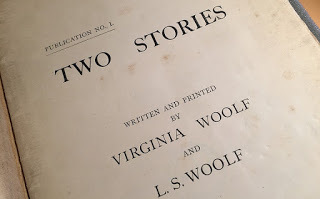
Woolf founded The Hogarth Press in order to publish works of prose or poetry “which could not, because of their merits, appeal to a very large public.” Through Hogarth, Woolf published other authors in addition to her own books.
I think of Dave Eggers. Is he self-published? Eggers founded McSweeney’s Books , which publishes other authors in addition to Eggers’ own books. "McSweeney's exists to champion ambitious and inspired new writing, and to challenge conventional expectations about where it's found, how it looks, and who participates."
I think of James Laughlin, poet and founder of New Directions . Was he self-published? From the start, New Directions was "dedicated to publishing quality works with little regard to their chances for commercial success." Laughlin published his own work and others, including F. Scott Fitzgerald's The Crack Up and the reissue of The Great Gatsby when it went out of print. He also published work by Henry James, E.M. Forster, and Evelyn Waugh at a time when other publishers wouldn't touch them.
And I think of other purportedly self-published authors. Among them are…Mark Twain, Charles Dickens, Walt Whitman, Marcel Proust, Henry David Thoreau, Emily Dickinson, Henry Adams, James Joyce, Laurence Stern, Jane Austen, Benjamin Franklin, Carl Sandburg, Ernest Hemingway, D.H. Lawrence, Beatrix Potter, T.S. Eliot, e.e. cummings, William Blake, Edgar Allan Poe …
This list is far from exhaustive.
Am I self-published? There was a time when this question might have worried me, but no more. I recently turned 40 and I have too much work to do.
But I identify strongly with the author/publishers I mentioned above.
And as a publisher custodian of Perpetua’s KinI’m also vigilantly aware of how problematic the perception and reception of literary work can be, especially when that work is subjected to a loaded catch-all like “self-published.”
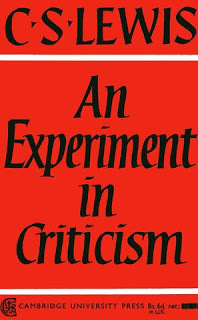 So while I realize that the reactions of readers and critics belong to the department of things one can’t control, still I’m compelled to ask questions. My questions are much like those asked by C.S. Lewis in his wonderful and wise 1961 book
An Experiment in Criticism
. How should we judge the quality of a book? How might we assess literary merit and literary taste? Despite its turgid title, Experimentis written in a compelling, almost conversational way, and Lewis proposes sensible and humane answers. He writes:
So while I realize that the reactions of readers and critics belong to the department of things one can’t control, still I’m compelled to ask questions. My questions are much like those asked by C.S. Lewis in his wonderful and wise 1961 book
An Experiment in Criticism
. How should we judge the quality of a book? How might we assess literary merit and literary taste? Despite its turgid title, Experimentis written in a compelling, almost conversational way, and Lewis proposes sensible and humane answers. He writes:
These questions fall to each of us. Especially in these times of instability, confusion, and loss of morale in mainstream publishing — which are also times of countervailing independence, innovation, and vivacity among individual authors and very small publishers — it falls to each of us to bear in mind what Lewis puts this way:
Dear reader, it’s up to you.
And I’m looking forward to sharing Perpetua’s Kinwith you. I believe it’s something special.
I’ll be writing more about Perpetua’s Kin in this space between now and the novel’s September 4th release. Meanwhile, Perpetua’s Kin pre-orders are open at the Atelier26 webstore .
{See my full author history HERE }
 I believe Perpetua’s Kin offers a uniquely affecting and surprising reading experience. And let me be clear. when I say I believe, I’m not talking about stubborn, run-of-the-mill confidence or defensiveness (e.g., “I think it’s good!”). No, I’m talking about belief that comes of having paid the existential costs of the book’s composition and editing process.
I believe Perpetua’s Kin offers a uniquely affecting and surprising reading experience. And let me be clear. when I say I believe, I’m not talking about stubborn, run-of-the-mill confidence or defensiveness (e.g., “I think it’s good!”). No, I’m talking about belief that comes of having paid the existential costs of the book’s composition and editing process.You will know what I mean if you’re a novelist and you’ve undergone a sacrificial, years-long dedication to a book, i.e., to the act of writing, rewriting, effacing, writing again, shaping, and drastically reshaping a raw mass of words until it becomes a novel. Becomes is the keyword here, for you do not make or even write a novel so much as suffer its convulsions, confusions, and convolutions until it emerges into clarity all its own and becomes. In other words, the novel becomes an artistic creation thoroughly and surprisingly itself — a creation apart from you, which has answered to its own demands, and therefore, in some mysterious but unquestionable way actually surpasses you: speaks in ways you don’t know how to speak, knows more than you know, feels more than you feel.
All this may seem esoteric to non-novelists, but some years ago, watching as my agent sent this novel out among the “decision-makers” of the publishing world, watching as it came back again and again, I began to understand that rather than some innate problem in the book, it was the book’s essential literary merit — its autonomous completeness as an artistic creation — that prohibited it from finding an advocate in mainstream publishing. This kind of paradox is all too common in today’s publishing industry.
So I’m releasing Perpetua’s Kin through Atelier26 Books , the nationally recognized literary press I founded some years ago in order to lift up good literary work. As the editor of Atelier26 I’ve had the privilege of helping a number of marvelous authors bring their books to readers. I believe deeply in the beauty and power of each Atelier26 book I’ve edited and published, and I can hardly describe how gratifying it’s been to watch a few of these titles receive prestigious award recognition . I’m proud to see Perpetua’s Kin join the company of all the excellent works at Atelier26.

While some of my own prior books have borne the Atelier26 logo, I’ve never actively promoted any of them. Mainly they’ve served to bolster the Atelier26 catalog and generate some extra proceeds for the press as a whole, while I’ve poured most of my energy and focus as a publisher into supporting and promoting my other authors. Perpetua’s Kin will be different, which brings me to confront anew that stamp of contempt used by so many literary folks who wish to stigmatize and dismiss a book without even looking at it: self-published.
What does self-published mean anyway?
I almost made that the parenthetical subtitle of this post, because part of what I’d like to do here, in providing my own professional history and personal perspective as an artist, editor, and publisher, is to complicate in some small way the stubbornly prevailing, mostly snarky understanding of “self-published author.”
Again, maybe you’re a literary author yourself. Maybe, at this moment in your life you’d never dream of self-publication. Maybe at this moment you’re riding high, perhaps with your own work of new literature hot off the press from an established commercial publisher big or small. Maybe your work has been well-reviewed but not particularly hot in sales. I have first-hand experience of those circumstances. You may find my story interesting.
So, with Perpetua’s Kin as a case in point, here’s one way to publish a “new” novel in 2018:
Between 2004 and 2007, publish 2 well-received novels with an established small press;
watch your novels receive wide and laudatory coverage in mainstream outlets & publishing media (USA Today, Publishers Weekly, San Jose Mercury News, Booklist, The Salt Lake Tribune, Library Journal, &c.);
watch as booksellers champion your novels (#1 Indie Next selection; Best of Indie Next; Indie Next Book of the Year Finalist; staff picks);
in what will become the busiest 6 months of your life, fly from Oakland to Minneapolis, from Oakland to Memphis, from Oakland to Seattle, from Oakland to Los Angeles on a bona fide author tour through more than 15 U.S. cities, meeting lots of folks who have read your book(s) or are buying a copy in order to do so;
speak publicly before thousands of people collectively; lecture; teach;
start that “new” novel (novel 3) in February 2007, a year before your son’s birth;
immerse yourself, as you’ve always done, in novelistic research (in this case the history of the telegraph; Civil War campaigns and prison camps; the geography of the U.S. south) & travel from your home in Oregon to Missouri and Iowa for this research;
complete novel 3 & receive a publisher’s offer in 2010;
decline the offer;
wait, while your NY literary agent submits the novel to other parties;
undertake your first Yaddo residency & start writing another novel (your fourth);
back at home, observe the dissolution of Borders Books and the closure of Borders stores everywhere ;
continue writing like hell, still awaiting responses to your agent's submissions of novel 3;
begin to realize, gradually, how much money Borders owed to publishers , and what those unpaid debts mean to the publishing industry as you’ve known it;
receive the news that the publisher of your first two books is cutting its operations way back;
watch the whole publishing ecosystem falter;
watch newspapers & magazines vanish & with them scores of book review outlets;
watch, dismayed, as independent bookstores (many of those that hosted you on tour) go out of business;
meanwhile, receive rejections for novel 3 & realize, to your horror, that publishers are playing it safe & deciding acquisitions on the basis of Nielsen Bookscan sales figures & other faulty marketplace metrics more often than on the basis of literary quality; understand, chagrined, that this is the new M.O.;
fret about the monopolistic ruthlessness of Amazon, the closure of more small bookstores, the hype surrounding e-books , the rise of the iPad;
notice that online star ratings & customer reviews now stand in for literary criticism;
compare the experience of fellow writers & note the industry’s new exclusive focus on gigantic advances and probable blockbusters, the all-but-conclusive disappearance of the long-endangered midlist ;
fret about the further conglomeration of mainstream publishing into just four major publishers all owned by multi-national media corporations ;
continue writing like hell;
meanwhile you are your son’s primary at-home parent: he is an infant, he is a toddler, he is in preschool, he is in kindergarten... ;
establish a publishing house called Atelier26 Books & try to help other writers by editing, publishing, & promoting their work (you will devote your more-than-full-time labor to this for years);
return to Yaddo, still writing like hell, and start your fifth novel;
receive grants & fellowships;
learn that your NY literary agent is retiring — you are now sans publisher and agent;
teach & lecture widely;
continue writing like hell, producing 5 other books, in addition to publishing essays & stories in national & regional literary journals & magazines, & frequent essays & reviews in The Oregonian ;
rejoice to see the rise of innumerable new & viable small presses;
marvel that your son is in 2nd grade ... 3rd grade ... ;
earn an MFA in Creative Writing after 7 books & 20 years as a writer;
seek a steady teaching job ;
entrust that “new” novel — yes, novel 3, the one you started in 2007, a year before your son’s birth — to Atelier26 Books in 2018, your son’s 10th year.
What does self-published mean, anyway? Different things in different contexts.
I think of Virginia Woolf. Was she self-published?

Woolf founded The Hogarth Press in order to publish works of prose or poetry “which could not, because of their merits, appeal to a very large public.” Through Hogarth, Woolf published other authors in addition to her own books.
I think of Dave Eggers. Is he self-published? Eggers founded McSweeney’s Books , which publishes other authors in addition to Eggers’ own books. "McSweeney's exists to champion ambitious and inspired new writing, and to challenge conventional expectations about where it's found, how it looks, and who participates."
I think of James Laughlin, poet and founder of New Directions . Was he self-published? From the start, New Directions was "dedicated to publishing quality works with little regard to their chances for commercial success." Laughlin published his own work and others, including F. Scott Fitzgerald's The Crack Up and the reissue of The Great Gatsby when it went out of print. He also published work by Henry James, E.M. Forster, and Evelyn Waugh at a time when other publishers wouldn't touch them.
And I think of other purportedly self-published authors. Among them are…Mark Twain, Charles Dickens, Walt Whitman, Marcel Proust, Henry David Thoreau, Emily Dickinson, Henry Adams, James Joyce, Laurence Stern, Jane Austen, Benjamin Franklin, Carl Sandburg, Ernest Hemingway, D.H. Lawrence, Beatrix Potter, T.S. Eliot, e.e. cummings, William Blake, Edgar Allan Poe …
This list is far from exhaustive.
Am I self-published? There was a time when this question might have worried me, but no more. I recently turned 40 and I have too much work to do.
But I identify strongly with the author/publishers I mentioned above.
And as a publisher custodian of Perpetua’s KinI’m also vigilantly aware of how problematic the perception and reception of literary work can be, especially when that work is subjected to a loaded catch-all like “self-published.”
 So while I realize that the reactions of readers and critics belong to the department of things one can’t control, still I’m compelled to ask questions. My questions are much like those asked by C.S. Lewis in his wonderful and wise 1961 book
An Experiment in Criticism
. How should we judge the quality of a book? How might we assess literary merit and literary taste? Despite its turgid title, Experimentis written in a compelling, almost conversational way, and Lewis proposes sensible and humane answers. He writes:
So while I realize that the reactions of readers and critics belong to the department of things one can’t control, still I’m compelled to ask questions. My questions are much like those asked by C.S. Lewis in his wonderful and wise 1961 book
An Experiment in Criticism
. How should we judge the quality of a book? How might we assess literary merit and literary taste? Despite its turgid title, Experimentis written in a compelling, almost conversational way, and Lewis proposes sensible and humane answers. He writes:“The first demand any work of art makes upon us is surrender. Look. Listen. Receive. Get yourself out of the way. (There is no good asking first whether the work before you deserves such a surrender, for until you have surrendered you cannot possibly find out.)”What does self-published mean? Specifically, what does it mean to you as a reader, reviewer, bookseller, award judge, fellow writer — or whoever you may be in the literary community? Is a self-published book simply a book you can more easily and justifiably ignore? Are you allowing labels — or stigmas — to obtrude upon your reading process and preempt the recognition (and celebration!) of quality in works of new literature?
These questions fall to each of us. Especially in these times of instability, confusion, and loss of morale in mainstream publishing — which are also times of countervailing independence, innovation, and vivacity among individual authors and very small publishers — it falls to each of us to bear in mind what Lewis puts this way:
“We can judge any sentence or even word only by the work it does or fails to do. The effect must precede the judgment on the effect. The same is true of a whole work. Ideally, we must receive it first and then evaluate it. Otherwise, we have nothing to evaluate.”
Dear reader, it’s up to you.
And I’m looking forward to sharing Perpetua’s Kinwith you. I believe it’s something special.
I’ll be writing more about Perpetua’s Kin in this space between now and the novel’s September 4th release. Meanwhile, Perpetua’s Kin pre-orders are open at the Atelier26 webstore .
{See my full author history HERE }
Published on May 16, 2018 11:20



